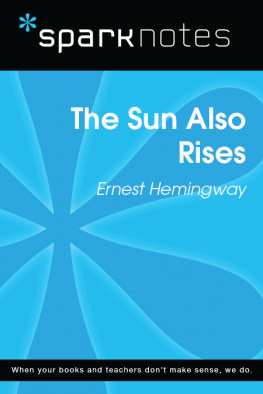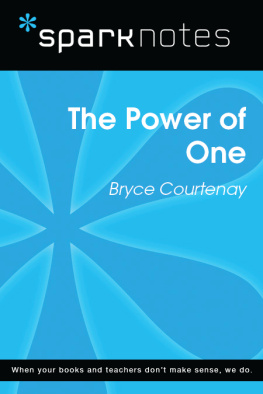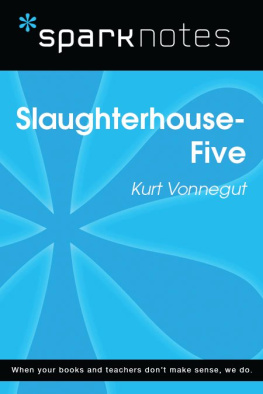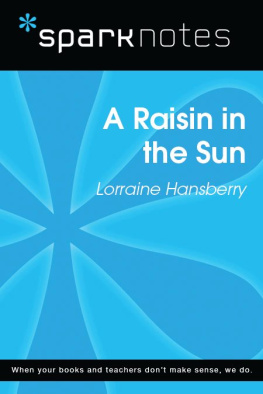Kindred
Octavia Butler
2003, 2007 by Spark Publishing
This Spark Publishing edition 2014 by SparkNotes LLC, an Affiliate of Barnes & Noble
All rights reserved. No part of this publication may be reproduced, stored in a retrieval system, or transmitted in any form or by any means (including electronic, mechanical, photocopying, recording, or otherwise) without prior written permission from the publisher.
Sparknotes is a registered trademark of SparkNotes LLC
Spark Publishing
A Division of Barnes & Noble
120 Fifth Avenue
New York, NY 10011
www.sparknotes.com /
ISBN-13: 978-1-4114-7607-3
Please submit changes or report errors to www.sparknotes.com/errors.
10 9 8 7 6 5 4 3 2 1
Context
Octavia Estelle Butler was born on June , 1947 , in Pasadena, California. Her father, a shoeshiner, died when Butler was an infant. Butlers mother, Octavia, and grandmother raised her. From an early age, Butler watched her mother work to keep the family afloat and heard her grandmothers tales of suffering and misery. Octavia worked as a housemaid in the homes of white people who treated her as if she were less than human. Butlers grandmother had been a slave in Louisiana, forced to work in the cane fields. These women, who endured oppression and supported their families, informed Butlers stories. She said that the misery of her female relatives lives inspired her to spin fantasy worlds into which she could escape.
As a child, Butler was known as Junie, possibly to distinguish her from Octavia, who shared her name. Butler was a quiet, extremely shy child. Although she suffered from dyslexia, she found solace in books. At age ten, Butler began writing. At age twelve, she developed an interest in science fiction that was to last for the rest of her life. Butler aspired to write science fiction featuring characters who, like her, felt disconnected from society. Through the fantasy societies she created, which were peopled by aliens, vampires, and other nonhumans, Butler was able to explore real-world problems of isolation, cruelty, and racism.
In 1968 , Butler earned an associates degree from Pasadena City College. She enrolled at California State University, but she left before earning her degree. Later, she took classes at the University of California, Los Angeles. Harlan Ellison, the renowned science fiction writer, taught Butler at the Clarion writing workshop. Butler supported herself by working odd jobs. She got up every morning at two to write.
Kindred is one of very few works of science fiction about slavery, and its first-person narrative makes it unique among books about slavery. Butler said that the idea for the novel came to her as she listened to a male classmate at Pasadena City College complain about how his parents held him back and how he wanted to kill off older generations of African-Americans. Butler wanted to write a story in response, one that would illustrate African-American history in a visceral way. In the novel, Butler tries to depict slaves as individuals, rather than lapsing into typecasts. She also attempts to portray the slaveholders with equity, showing not only their cruelty but also their humanity.
Butler is often hailed for her success as a black woman writer of science fiction, a genre dominated by white men. She said that her experience as a black woman in a hostile society made her singularly capable of writing about dystopias. She also said that she was writing not for other people, but for herself. Although she was glad if her work helped others, she said that writing each of her works forced her to grow in new ways, and that she wrote to create herself.
Most of Butlers fictional creations are aliens and other nonhuman characters, but all of them have complex human traits. Her first novel, Patternmaster ( 1976 ), was the first published in the Patternist series, which explored a society run by a race of telepathic people who were attempting to create a superhuman race. Butler wrote twelve novels, including Parable of the Sower ( 1993 ), Parable of the Talents ( 1998 ), and Fledgling ( 2005 ). She also published a short story collection called Bloodchild in 1995 .
In 1995 , Butler won the MacArthur fellowship. She was the first science fiction writer ever to receive the award. Among other awards, Butler won two Hugo Awards from the World Science Fiction Society and two Nebula Awards from the Science Fiction Writers of America.
Octavia Butler died on February , 2006 , after falling near her home in Lake Forest Park, Washington.
Plot Overview
On June , 1976 , it is the twenty-sixth birthday of Dana, a young black woman. She and Kevin Franklin, her white husband, move into their new apartment in Southern California. Dana does the majority of the unpacking and settling in; Kevin focuses on his office and then stops helping. Dana gets dizzy, and her surroundings fade away. When she comes to, she finds herself in the early 1800 s in Maryland. A young white boy named Rufus is struggling in a river. Dana wades in after him, but he is unconscious by the time she reaches him. She drags him to the shore and resuscitates him. Tom Weylin, Rufuss father, arrives and points a gun at Dana, terrifying her. Following another dizzy spell, she reappears in her apartment in 1976 .
Several minutes later, Dana again gets dizzy and disappears. This time, she is whisked back to 1815 . Rufus, now a few years older, watches in horror as his bedroom drapes burn. He had set fire to them because he was angry with his father for selling a horse he wanted. Dana puts out the fire, talks to Rufus, and escapes from the house before Weylin finds out she is there. She runs to the home of Alice Greenwood and her mother, free blacks who Dana suspects may be her ancestors. A group of young white men smash down the Greenwoods door, drag out Alices husband, who is a slave, and beat him. They also beat Alices mother. After the men leave, Dana comes out of hiding and helps Alices mother. Dana steps outside, and a returning white man finds her, beats her, and attempts to rape her. Dana fears for her life. Following another dizzy spell, she returns home to her own time.
The next time Dana time travels, Kevin comes with her by holding onto her. Back at the Weylins, Rufus has fallen out of a tree and broken his leg. Nigel, a young black boy, runs for help, and Weylin comes with his slave, Luke. Rufus will not let Dana leave, so everyone returns to the house together. Kevin and Dana stay on the plantation for several weeks and help educate Rufus. But when Dana gets caught teaching Nigel to read, Weylin whips her. Dana returns to 1976 , but Kevin does not arrive in time to go with her.
After eight days at home, Dana time travels back and finds that Kevin has left the Maryland area and that Rufus has raped Alice Greenwood. Alices husband, Isaac, a slave, is beating Rufus badly. Dana convinces Isaac not to kill Rufus, and Alice and Isaac run away while Dana gets Rufus home. She stays in Maryland for two months. Although Rufus lies about how he got injured, Alice and Isaac are caught, and Alice is beaten and ravaged by dogs. As punishment for helping Isaac escape, Alice is made a slave. Rufus, who is in love with Alice, buys her. He forces Dana to convince Alice to sleep with him after her body has recovered. After Rufus fails to mail her letters to Kevin, Dana attempts to run away. As a result, she receives a vicious whipping, which so hurts and frightens her that she loses the will to run away again. Kevin shows up, as Weylin had written to him, and the couple attempts to escape. Rufus catches them on the road and shoots at them, but they manage to time travel together back to the 1970 s.



















